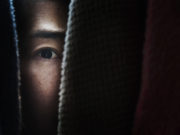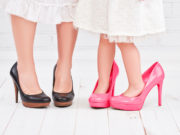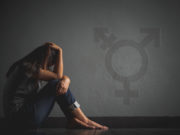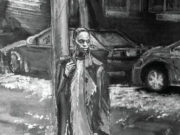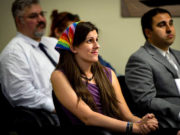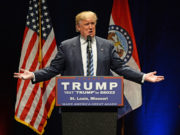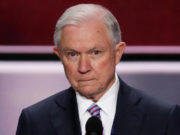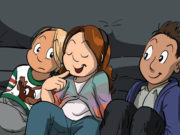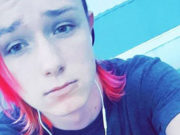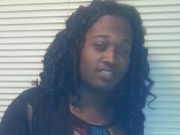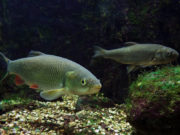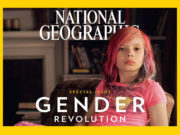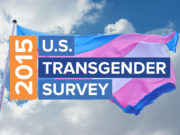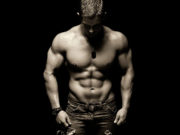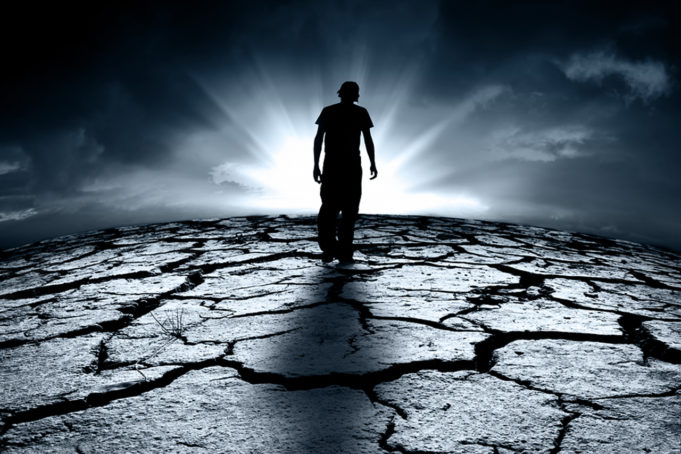I’ve had anxiety since at least the 5th grade. At first, I didn’t know what the racing thoughts and desire to hide myself far away from people was about. I didn’t have the word anxiety, but it was there, and it affected my life in a lot of ways. It was hard to make friends or be in social spaces with many people. I spent too much time over thinking every interaction. It kept me from being anywhere on time. By high school, it would take me anywhere from 2-4 hours to get ready for anything that wasn’t school. (And that only took less time because I wore a Catholic school uniform every day and didn’t have a choice not to go, but that’s a whole other story.) By college, I spent a lot of time obsessing over whether I actually wanted to go places. Then more time trying on all my clothes and hating the way everything looked. At that point I had mostly masculine clothes. It wasn’t until after college that I realized my anxiety was tied very closely to my dysphoria. The best way I can describe dysphoria is when my body doesn’t feel/look the way my mind is expecting it to, and instead I am filled with disgust and sadness. Figuring out how I wanted my body to look was the hard part. I’ve identified as a lot of things over the years, but FTM was never really one of them. While I’ll admit I occasionally posted in the hashtag, I don’t identify as solely male.
Most people look at me a bit confused when I say I don’t identify as male. They ask questions like, “So why did you transition?” or “Didn’t you know what testosterone would do?” That’s when I politely tell them, “Yes I did actually look up the effects of testosterone before injecting it into myself for years.” I explain that gender is a spectrum, not a binary, and while some trans folk identify with the binary, many don’t. I identify as genderfluid and often use the words genderqueer or non-binary to describe myself. And while my gender expression may look very masculine at times, it is only one part of my identity. I have very feminine parts of myself that I have finally come to love and accept, most of which comes out through my personality and mannerisms. A lot of the time the group of people that I am with will change how I’m feeling in the moment. Sometimes I still feel like a woman in all female-spaces and other times I feel less like any specific gender and more just like me- Mena.
“Society had created gender boxes too narrow to fit in, and I didn’t want to be a part of it.”
The first word I used to describe my gender identity was genderf*ck. I hated gender roles and expectations, and I didn’t need a gender. Society had created gender boxes too narrow to fit in, and I didn’t want to be a part of it. I had gone through high school thinking there was something seriously wrong with me. I hated some parts of my body and my voice. But the only word I had related to gender identity at the time was transsexual, and I knew I didn’t want to be a man. I struggled to find where I fit in an age that was still pre-tumblr. Then, I got to college and met the person who would soon become my first girlfriend, we’ll call her E. Oh, did I mention I’m gay? Yeah I’m really gay. So E told me she was genderqueer, and it immediately resonated with me. I found that I could exist outside of the binary, but I was still confused about my body. I purged my wardrobe of the large amount of feminine clothes I had gotten in high school after the pressure to assimilate had sunk in. I bought loose clothes and started binding my 36C size chest. I was 19. At first,it was only an occasional thing, about a year later I would start more regularly, eventually binding for a total of nine years. I tried to be happy with the small steps I had taken. After college E and I didn’t talk much, and I lost the queer community I had built at school.
Four years later I was at an all time low, in and out of psychiatric hospitals, on a cocktail of eight medications, and having suicidal ideations daily. My small steps weren’t enough, my body and voice caused me too much dysphoria to function anymore, and combined with CPTSD from my adolescence, I was a mess. I decided it was time to come out to my family and finally start a medical transition. Fearing how my off-the-boat Italian parents would react was the main reason I had waited so long. It wasn’t the calm and supportive talk I had hoped for, but they didn’t kick me out or try to stop me from transitioning.

I wasn’t positive that testosterone was right for me, but I wasn’t sure what else I could try. I was terrified I might be making the wrong choice, and I was afraid to talk to anyone about these fears. The truth is I hadn’t met or seen anyone in the media who remotely resembled me or my gender identity. I didn’t have any trans, or GNC friends and I had no idea what a non-binary transition was supposed to look like. I know now that of course there is no right or wrong way to transition your body if it makes you happy. When I started testosterone I really wasn’t sure what to expect. In truth, I would have had top surgery first had it been covered by insurance. But as it wasn’t an option at the time, T seemed like the next best thing. I started on August 6th 2012, a day after my 24th birthday. I had done my research and was most scared about how I would feel about body/face hair. I decided that my voice dropping and body fat redistributing was worth some extra hair, and that I could always stop if I felt uncomfortable. I didn’t feel uncomfortable at all; I started feeling better than I could ever remember.
The first two years of my transition pulled me closer to the masculine side of the spectrum. Testosterone came with polarizing feelings that took time to even out. Eventually I started being perceived as male. Although it was never my goal, it helped with social anxiety and constant misgendering. It also gave me the ability to be more feminine without being misgendered as female.
“Sam gave me the courage to start using the words I had claimed in college (genderqueer, genderfluid) and gave me new words like non-binary.”
Then 3 years ago I met my partner Sam, and finally began interacting with another genderqueer person who was actively living outside the binary. Sam gave me the courage to start using the words I had claimed in college (genderqueer, genderfluid) and gave me new words like non-binary. They essentially validated my identity as a gender-fluid person just by existing and gave me the strength to use they/them pronouns and start incorporating femininity back into my gender expression. A year later we started dating and Sam introduced me to an amazing community of queers in NYC that we proudly call our “soul family”.
I’m 5 years on T now, and it’s been 1 year since my top surgery, my only occasional fleeting regret is that I didn’t start T or have top surgery earlier. Loving my body is still a struggle some days, but it’s much easier than it ever was. After I put on a shirt I don’t check every mirror in the house to make sure my chest is flat enough. I don’t cringe when I hear the sound of my own laugh or voice. And although some days it’s still hard to leave my house, the crippling dysphoria doesn’t happen very often anymore. I still have anxiety but it’s not as severe and I’ve learned productive/natural ways to help. Now that I feel comfortable in my skin I’m learning to love myself more fully and trying to chip away at unhealthy thought patterns and coping mechanisms I accumulated after 26 years of hating myself.
My gender transition may have started at 19, but it’s a journey I will be on for the rest of my life. My gender is fluid and I am constantly evolving and learning more about myself. Accepting who I was and letting go of what others think of me has been the healthiest decision I’ve made to date. Now I’m a decade into my transition, educating others on the trans/GNC community and seeing the importance of visibility and intersectionality in my work with LGBT homeless youth. It’s time for me to give back to this wonderful community and so I’m here to share my experiences and learn about yours.
For readers who are Non-binary- What has your Non-binary transition been like?
For readers who are medically transitioning- How did you decide to take the step to transition if you weren’t 100% positive?
For everyone- Did anything from my story resonate with you?


